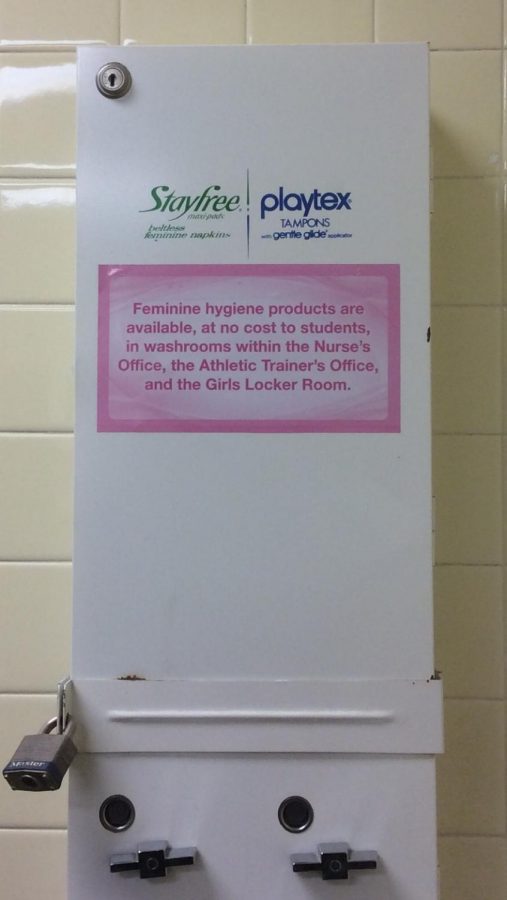D211 schools need to implement new Illinois law
The Learn With Dignity Act mandates that school restrooms be supplied with free feminine hygiene products.
February 1, 2018
As of January 1, 2018, over 200 new laws have been put into place by the Illinois State legislature.
While some of these laws will have little to no effect on our daily lives, such as corn being named the official state grain (it’s also the official state vegetable as of 2015, FYI), others have great potential for reform, especially to younger generations. The complete list can be found here.
HB3215, also known as the Learn with Dignity Act is one of the most impactful to high school and junior high students.
It states that public schools must make feminine hygiene products available as a gratuity to students in school bathrooms.
The General Assembly lists that female students in Illinois have proven to “miss multiple days of school every month” due to their menstrual cycles. And, that the interruption this natural biological cycle causes to their daily lives could be minimized by having access to quality feminine hygiene products while they are at school.
They have also noted that these products, including tampons and sanitary napkins, are a “health care necessity.”
Opinions from female students portray a grateful, but “it’s-about-time” attitude towards the new policy.
In regards to the General Assembly deeming feminine care products as “a health care necessity,” Palatine sophomore Chase Friel had quite an astonished response, “Like, oh, have you just discovered that?”
Palatine High School, however, has yet to comply with the law to the fullest and most appropriate extent, despite the undeniable necessity and right for free feminine hygiene products to be available in school bathrooms at no cost to students.
PHS does offer complimentary tampons and pads to students in the girls P.E. coaches office, the school nurse, and the trainer’s office, but not in restrooms.
Unfortunately, this solution is about as convenient as putting a sign on an empty toilet paper roll that states, “Free toilet paper can be found 2 floors down after making 2 right turns in the room at the end of the hall. Thanks for your cooperation.”
Even more disappointingly, this has been the designated solution for not only PHS, but all D211 schools.
When I interviewed the school nurse, Mrs. Pawlowski, on why the school hasn’t made the products available in the bathrooms, she dismissed it as a non-issue.
According to Pawlowski, when I explained that the Learn With Dignity Act was designed to help students who couldn’t afford feminine hygiene products, so that they wouldn’t have to miss school on a monthly basis due to a natural biological cycle, “we don’t have that issue here.”
She said that she was sure that if the school put free tampons and/or pads in the girls bathroom at 8:15am, they’d be long gone by 8:30am.
“There’s always a possibility for abuse.”
Which is quite presumptuous, especially considering that toilet paper, paper towels, and other basic hygiene products are free, but those don’t seem to be a budget issue.
It could; however, be a budget issue for a family with 3 girls in a single-income household, which is precisely why the Learn With Dignity Act was designed.
Fortunately, Palatine High School assistant principal, Michael Alther, has assured me that efforts will be made to alleviate these issues and to make sure that Palatine’s female students are not discriminated against in terms of basic hygienic necessities.
The time period in which this is going to happen has yet to be determined.
The products are expensive for women to purchase on their own, and that it’s only right that free access to them is granted. To put it in comparison for men, imagine being charged upwards of $7 for a box of Kleenex.
And that’s only the tip of the iceberg.
An average menstrual cycle lasts 3 to 7 days for most women, and it isn’t exactly a painless ordeal either. The further expenses can be attributed to cramping, cravings, emotional swings and acne breakouts just to list a few exceedingly common symptoms reported by women.
On average, according to The Huffington Post, a woman will spend $18,171 on her period over the course of her lifetime. The details can be found here, but the point is to understand that being a girl is expensive.
For students who can’t afford these pricey but necessary items, they are forced to be absent from school and miss valuable hours of education. Unfortunately, this would also affect these student’s eligibility for programs such as Harper’s Promise, which count numbers of days absent against the student’s potential to earn the scholarship.
Another hope with the new law is to minimize the inconvenience of menstruation for as many female students as possible. When first hearing of the new requirements for schools, most girls were extremely pleased.
“That would be super convenient,” PHS sophomore Christina Buckstaff said. “Especially for the times when your period catches you off guard and you’re stuck in the bathroom with nothing. Then, you have to go back to class and decide if you should grab something and go to the bathroom again and have everybody think ‘what’s up with that girl’, or you sit there and hope you don’t make a big mess.”
In addition to facing a lot of awkwardness and humiliation, an unexpected period can become a huge distraction for girls when the only thing they should be concentrated on is their schoolwork.
“And then you can’t focus in class because all you can think about is the fact that you’re bleeding,” Buckstaff said.
This is exactly the kind of stigma that legislators are trying to combat with the new law. The Learn with Dignity Act began with schools in New York City, and was supported by Planned Parenthood of Illinois before its passage.
According to plannedparenthood.org, “In New York City, the schools saw a noticeable increase in the attendance rates once feminine hygiene products were made available.”
It goes without saying that the law will positively impact female students, but despite the overwhelming amount of supportive evidence for benefit, it still faced disapproval by some legislators.
“Yes, some complain that schools are not given enough of our tax money, and then pile on more costly mandates, increasing the price,” Illinois State Senator Kyle McCarter, R-Lebanon said via Facebook. “Where does this end? Bankruptcy? Who first? Government or the fleeced taxpayers?”
McCarter voted against the bill based on his claim that absolutely necessary feminine hygiene products are “costly mandates.” Next time McCarter gets a nosebleed, someone should deny him a Kleenex.
Additionally, Superintendent Jeff Dosier from Belleville Township High School District 201 voiced his opinion on the new legislation.
“Schools had a system in place to take care of the issue, and in my opinion, it did not need to be legislated,” Dosier said.
The previous “system” that Dosier is referring to requires students to walk down to the nurse’s office and specifically request a pad or tampon every time they need one.
Clearly, Dosier has never had the mortifying experience of publicly announcing that he was bleeding into his underwear to not only the school nurse, but also anyone else who was sitting in her office, potentially including male peers.
Unfortunately, this was the system in most public schools prior to the Learn with Dignity Act.
Girls will no longer have to face the embarrassment of walking into the nurse’s office and announcing their period to the whole world. Now they can take care of their periods discreetly and with minimal academic distraction.
Furthermore, a global concern to the issue is how girls in impoverished countries will access feminine hygiene products during their times of the month.
Luckily, a charity known as Days for Girls is dedicated to precisely this cause. They’ve recently provided feminine care to their millionth girl, and need all the help they can get to reach even more. The Days for Girls website can be accessed here, and even the smallest donation makes a difference.
Limited access to unaffordable products shouldn’t mean that girls need to suffer public humiliation and discomfort. Basic hygiene is a fundamental human right, and no one should be denied the dignity they deserve.








